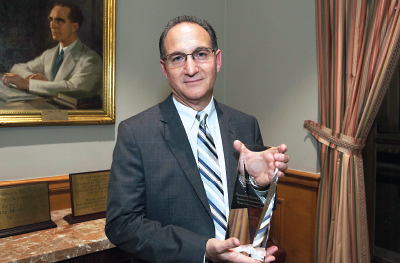In a ceremony November 19 at the U.S. Supreme Court, Judge Steven Leifman, J.D., was honored with the 2015 William H. Rehnquist Award for Judicial Excellence from the National Center for State Courts for his work on behalf of people with mental illness in the Miami-Dade (Fla.) County criminal justice system.
Chief Justice John Roberts noted that Leifman’s dedication to improving the justice system by helping those with mental illness served as an excellent example for everyone in the legal system.
“I’m extraordinarily gratified,” Leifman told Psychiatric News. “But it is more important that the Chief Justice of the United States recognized the importance of our work to reduce the overrepresentation of people with mental illness in the criminal justice system.”
Leifman, who also serves on the Board of Directors of the American Psychiatric Association Foundation, has long advocated for and implemented programs to divert minor offenders who have mental illness to treatment resources and community support.
Such programs include mental health courts as well as crisis intervention training (CIT) for law enforcement officers. Ideally, CIT provides alternatives to arrest in cases of confrontations with police and leads instead to evaluation and treatment for people with mental illness.
In Miami-Dade County from 2010 to 2015, there were more than 48,000 mental health calls to police, but those resulted in only 109 arrests, said Leifman. The total jail population dropped from 7,800 to 4,400, allowing the county to close one jail. “The county saved money but, more importantly, these people got their lives back,” Leifman said.
Leifman’s Miami-Dade court includes personnel who help to connect people with mental illness to Social Security and health insurance systems, which cover some of the costs of treatment and other community support programs.
“It is important to recognize a larger American problem: the rising presence of people with mental illness in our jails and prisons even as the general prison population declines,” said Leifman at a briefing in Washington, D.C., before receiving his award. The intersection of the criminal justice and mental health systems is “fragmented, under-resourced, and outdated.”
Solving this problem cannot be accomplished by one person, one level of government, or one party, he said. “We are used to an adversarial criminal justice system, but we need to reach across boundaries.”
The APA Foundation is taking an active role in that effort through its participation in the Stepping Up Initiative along with the National Association of Counties, the Justice Center of the Council of State Governments, and the U.S. Department of Justice’s Bureau of Justice Assistance. The initiative seeks to reduce the number of people with mental illness in U.S. prisons and jails (
Psychiatric News, June 5).
“To help counties obtain the tools to get people out of the criminal justice system and into treatment, the Stepping Up Initiative will convene a summit meeting in April 2016 in Washington,” APA President Renȳe Binder, M.D., a forensic psychiatrist at the University of California, San Francisco, noted at the briefing.
Also during the briefing, Sen. Al Franken (D-Minn.) urged support for the bipartisan Comprehensive Justice and Mental Health Act (S 993/HR 1854) which would reauthorize and improve legislation passed in 2004 to provide support for veterans and mental health courts and advance training in mental health for law enforcement personnel, among other provisions. Franken is cosponsoring the legislation with Sen. John Cornyn (R-Texas). ■
More about Leifman’s work in Miami can be accessed
here. Binder’s commentary, “Stepping Up to Address Our Nation’s Shame,” is available
here.

